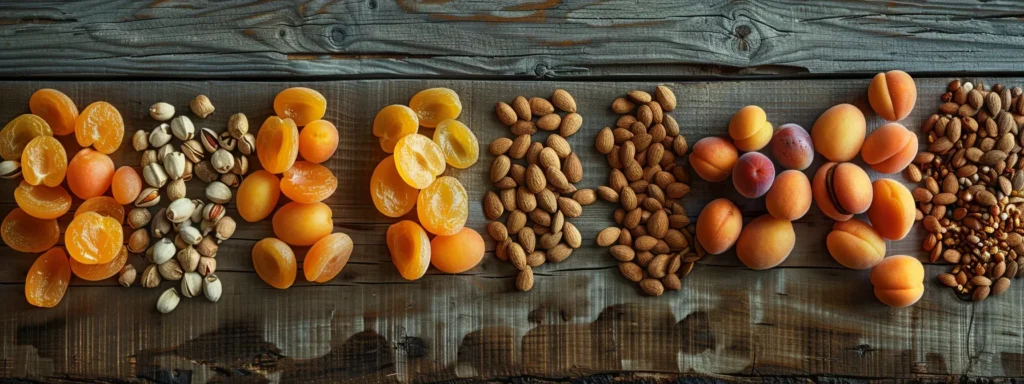Exploring the Potential Health Benefits of Apricot Seeds
The quest for natural health remedies often leads to the exploration of fruits, vegetables, and their less-consumed counterparts, like seeds and kernels. Apricot seeds, for example, have been subject to significant debate regarding their potential health benefits and associated risks. A better understanding of these aspects can help consumers make informed decisions about incorporating them into their diets. Below, we delve into the world of apricot seeds, examining everything from their nutritional content to their safe consumption practices.
Amygdalin in Apricot Seeds: Examining its Role in Health

Amygdalin, a compound found in apricot seeds, has been the subject of both interest and controversy. Also referred to as vitamin B17, this compound has been purported to help in the prevention of cancer, although scientific consensus on this claim is lacking. The body converts amygdalin into cyanide, which is toxic in high amounts, sparking an important debate on the safety of apricot seed consumption.
Supporters of amygdalin’s health benefits believe its targeted toxicity could potentially be harnessed as a therapy for cancer cells. However, the scientific community remains cautious, as there is insufficient evidence to support these claims. Thus, more research is necessary to thoroughly understand amygdalin’s role and effectiveness.
It is crucial for those who consider incorporating amygdalin through apricot seeds into their health regimen to remain informed about ongoing research and recommendations from health authorities. The balance between potential benefits and risks must be carefully weighed, especially in the context of alternative treatments for serious conditions like cancer.
The Debate Over Apricot Seeds and Cancer Prevention
The conjecture around apricot seeds and their role in cancer prevention is a heated topic among health experts and consumers alike. Central to this debate is the presence of amygdalin and its aforementioned potential effects. While some anecdotal evidence and preliminary studies have suggested a link between apricot seed consumption and cancer cell inhibition, these claims have not been substantiated by robust clinical research.
Critics voice concerns over the possible dangers of self-administering apricot seeds as an alternative cancer treatment due to the risk of cyanide poisoning. Medical professionals caution against foregoing conventional cancer therapies in favor of unproven methods. Hence, the stance within the scientific community advocates for evidence-based treatments, with apricot seeds remaining a supplement rather than a cure.
As scientific scrutiny continues to investigate the relationship between apricot seeds and cancer prevention, it remains essential for consumers to rely on credible sources and qualified healthcare guidance when considering their options. The allure of natural therapies should not overshadow the need for evidence-backed medical advice and safety.
Understanding the Nutritional Profile of Apricot Seeds

Apricot seeds, also known as kernels, have been consumed in various cultures for their nutritional value. These seeds are notably rich in proteins, essential fatty acids, and antioxidants. Additionally, they contain micronutrients such as vitamins B17 and E, and minerals like magnesium, phosphorus, and potassium, which contribute to overall health and well-being.
While the potential health benefits of apricot seeds are often attributed to their vitamin and mineral content, it is crucial to understand the full context of their nutritional makeup. The presence of dietary fiber in these seeds supports digestive health and can play a role in maintaining a healthy weight by promoting a feeling of fullness.
Consumers seeking to integrate apricot seeds into their diet can find them in various forms, including raw, dried, or in supplemental forms such as apricot seed capsules. Each form may offer a different concentration of nutrients, making it essential to choose according to individual health goals and dietary requirements.
Safe Consumption Practices for Apricot Seeds
When incorporating apricot seeds into one’s diet, understanding safe consumption practices is paramount to avoid potential health risks. Guidelines typically suggest limiting intake to only a few kernels per day. Adhering to recommended serving sizes can prevent the adverse effects associated with excessive amygdalin consumption, such as cyanide toxicity.
It is also advisable to seek out high-quality sources of apricot seeds to ensure purity and correct labeling. Whole, natural apricot seeds can vary in amygdalin content, so sourced and processed products, like apricot seed capsules, may offer more consistent dosages. Such standardized supplements could be a safer option for those concerned with precise intake levels.
Overall, while apricot seeds may offer a range of potential health benefits due to their nutritional composition and antioxidant properties, it is essential to approach their consumption carefully. Considering the ongoing debate and research on amygdalin and the need for safe consumption practices, a balanced and informed perspective is critical when determining their place in a health-conscious lifestyle.




